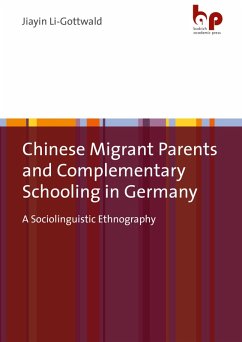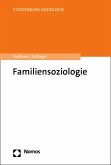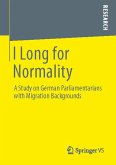Chinese Migrant Parents and Complementary Schooling in Germany (eBook, PDF)
A Sociolinguistic Ethnography


Alle Infos zum eBook verschenken

Chinese Migrant Parents and Complementary Schooling in Germany (eBook, PDF)
A Sociolinguistic Ethnography
- Format: PDF
- Merkliste
- Auf die Merkliste
- Bewerten Bewerten
- Teilen
- Produkt teilen
- Produkterinnerung
- Produkterinnerung

Hier können Sie sich einloggen

Bitte loggen Sie sich zunächst in Ihr Kundenkonto ein oder registrieren Sie sich bei bücher.de, um das eBook-Abo tolino select nutzen zu können.
How do parents cooperate with each other, what value do they attach to their interaction and how is the degree of cooperation related to social status? The study takes a close look at the social relationships among various groups of Chinese parents at a Chinese Mandarin language school in a metropolitan city in Germany. Taking an ethnographic approach, it captures a vivid picture of the parental social interactions in and outside the Chinese school setting. The study reveals the significance of social interactions, discussing it in relation to the parents' socioeconomic backgrounds and individual migrant trajectories.…mehr
- Geräte: PC
- ohne Kopierschutz
- eBook Hilfe
- Größe: 3.77MB
- FamilySharing(5)
![Der Einfluss muslimischer Religiosität auf die gesellschaftliche Integration von Einwanderern in Deutschland (eBook, PDF) Der Einfluss muslimischer Religiosität auf die gesellschaftliche Integration von Einwanderern in Deutschland (eBook, PDF)]() Martina SauerDer Einfluss muslimischer Religiosität auf die gesellschaftliche Integration von Einwanderern in Deutschland (eBook, PDF)0,00 €
Martina SauerDer Einfluss muslimischer Religiosität auf die gesellschaftliche Integration von Einwanderern in Deutschland (eBook, PDF)0,00 €![Why? (eBook, PDF) Why? (eBook, PDF)]() Charles TillyWhy? (eBook, PDF)21,99 €
Charles TillyWhy? (eBook, PDF)21,99 €![Wissenschaftskarrieren und Gender Bias (eBook, PDF) Wissenschaftskarrieren und Gender Bias (eBook, PDF)]() Wissenschaftskarrieren und Gender Bias (eBook, PDF)0,00 €
Wissenschaftskarrieren und Gender Bias (eBook, PDF)0,00 €![Familiensoziologie (eBook, PDF) Familiensoziologie (eBook, PDF)]() Michael FeldhausFamiliensoziologie (eBook, PDF)24,00 €
Michael FeldhausFamiliensoziologie (eBook, PDF)24,00 €![Binationale Herkunft und Zugehörigkeit (eBook, PDF) Binationale Herkunft und Zugehörigkeit (eBook, PDF)]() Gwendolyn GilliéronBinationale Herkunft und Zugehörigkeit (eBook, PDF)0,00 €
Gwendolyn GilliéronBinationale Herkunft und Zugehörigkeit (eBook, PDF)0,00 €![I Long for Normality (eBook, PDF) I Long for Normality (eBook, PDF)]() Devrimsel Deniz NergizI Long for Normality (eBook, PDF)40,95 €
Devrimsel Deniz NergizI Long for Normality (eBook, PDF)40,95 €![Die Entwicklung der Persönlichkeit eines Individuums nach den Theorien von Herbert Blumer und Pierre Bourdieu (eBook, PDF) Die Entwicklung der Persönlichkeit eines Individuums nach den Theorien von Herbert Blumer und Pierre Bourdieu (eBook, PDF)]() Marja-Lisa LemminDie Entwicklung der Persönlichkeit eines Individuums nach den Theorien von Herbert Blumer und Pierre Bourdieu (eBook, PDF)13,99 €
Marja-Lisa LemminDie Entwicklung der Persönlichkeit eines Individuums nach den Theorien von Herbert Blumer und Pierre Bourdieu (eBook, PDF)13,99 €-
-
-
Dieser Download kann aus rechtlichen Gründen nur mit Rechnungsadresse in A, B, BG, CY, CZ, D, DK, EW, E, FIN, F, GR, H, IRL, I, LT, L, LR, M, NL, PL, P, R, S, SLO, SK ausgeliefert werden.
- Produktdetails
- Verlag: Budrich Academic Press
- Seitenzahl: 244
- Erscheinungstermin: 4. April 2022
- Englisch
- ISBN-13: 9783966659482
- Artikelnr.: 63686700
- Verlag: Budrich Academic Press
- Seitenzahl: 244
- Erscheinungstermin: 4. April 2022
- Englisch
- ISBN-13: 9783966659482
- Artikelnr.: 63686700
- Herstellerkennzeichnung Die Herstellerinformationen sind derzeit nicht verfügbar.
1.1 Introduction 1.2 Chinese migration in Germany
1.2.1 The history of Chinese migration in Germany
1.2.2 Chinese immigrants in Germany
1.3 Complementary schooling
1.3.1 Defining complementary schooling
1.3.2 An overview of the literature
1.3.3 The research context: Complementary schools in Germany
1.3.4 The Gap Chapter
Chapter 2 The Notions of Social Capital and the Relatedness to the Concept of Guanxi
2.1 Introduction
2.2 Three notions of social capital
2.2.1 Class-based notion of social capital
2.2.2 social capital and civic engagement 2.2.3 social capital and youth education
2.3 Guanxi and its relatedness to social capital Chapter
Chapter 3 Research design and methodology
3.1 Introduction 3.2 Research philosophical stance
3.3 Research methodology
3.3.1 Qualitative study
3.3.2 Ethnographically orientated multilingual research
3.4 Research design
3.4.1 The local context - Hua Hua School
3.4.2 The participant groups
3.4.3 Researcher and the researched
3.5 Data collection design
3.5.1 Method of data collection: Participant observation
3.5.2 Data collection tools
3.6 Data analysis
3.6.1 Poststructuralist perspectives
3.6.2 Approach
3.6.3 Analysing the data Chapter
Chapter 4 The Networkers
4.1 Introduction
4.2 Overview of the participants
4.3 An overview of group relations
4.3.1 Forming the Networker group on Saturday mornings
4.3.2 The interaction patterns and group relations
4.4 The main themes
4.4.1 Friendship and group solidarity
4.4.2 Engagement with the local Chinese community
4.4.3 Engagement with German society
4.4.4 The maintenance of Mandarin language and Chinese ties for their children
4.4.5 The navigation of parenthood
4.4.6 Business and job opportunities
Chapter 5 The High-Profiles
5.1 Introduction
5.2 Overview of the participants
5.3 An overview of group relations
5.3.1 Forming the High-Profile group on Saturday afternoons
5.3.2 The interaction patterns and group relations
5.3.3 High social status at the school
5.4 The six main themes
5.4.1 Maintenance of the shared history in China
5.4.2 Friendship and group solidarity
5.4.3 Engagement with the local Chinese community
5.4.4 Engagement with local German society
5.4.5 The navigation of parenthood
5.4.6 Business and job opportunities Chapter
Chapter 6 The Marginalised
6.1 Introduction
6.2 Overview of the participants
6.3 An overview of the group
6.3.1 Forming the group on Saturday mornings
6.3.2 The interaction patterns and group relations
6.3.3 Low social status at the school
6.4 The five themes
6.4.1 Group belonging and solidarity
6.4.2 Alternative engagement with the local Chinese community mediate through their children
6.4.3 Engagement with German society
6.4.4 The maintenance of various Chinese linguistic forms and rural Chinese values
6.4.5 The navigation of parenthood
Chapter 7 A site of safe space, the reproduction of social order and Guanxi
7.1 Introduction
7.2 The most significant findings
7.2.1 A safe site for group solidarity, friendship and trust
7.2.2 Engagement with the local Chinese community
7.2.3 Engagement with German society
7.2.4 Construction of parenthood
7.2.5 Hua Hua School - a microcosm of the reproduction of social order
7.3 A Chinese interpretation
7.4 Conclusion
Chapter 8 Guanxi and the significant of social capital in the Chinese complementary school
8.1 Introduction
8.2 Revisiting the Questions for the Study
8.2.1 The nature of the social relationships: emotional bonds, group belonging, solidarity and trust
8.2.2 Facilitating
1.1 Introduction 1.2 Chinese migration in Germany
1.2.1 The history of Chinese migration in Germany
1.2.2 Chinese immigrants in Germany
1.3 Complementary schooling
1.3.1 Defining complementary schooling
1.3.2 An overview of the literature
1.3.3 The research context: Complementary schools in Germany
1.3.4 The Gap Chapter
Chapter 2 The Notions of Social Capital and the Relatedness to the Concept of Guanxi
2.1 Introduction
2.2 Three notions of social capital
2.2.1 Class-based notion of social capital
2.2.2 social capital and civic engagement 2.2.3 social capital and youth education
2.3 Guanxi and its relatedness to social capital Chapter
Chapter 3 Research design and methodology
3.1 Introduction 3.2 Research philosophical stance
3.3 Research methodology
3.3.1 Qualitative study
3.3.2 Ethnographically orientated multilingual research
3.4 Research design
3.4.1 The local context - Hua Hua School
3.4.2 The participant groups
3.4.3 Researcher and the researched
3.5 Data collection design
3.5.1 Method of data collection: Participant observation
3.5.2 Data collection tools
3.6 Data analysis
3.6.1 Poststructuralist perspectives
3.6.2 Approach
3.6.3 Analysing the data Chapter
Chapter 4 The Networkers
4.1 Introduction
4.2 Overview of the participants
4.3 An overview of group relations
4.3.1 Forming the Networker group on Saturday mornings
4.3.2 The interaction patterns and group relations
4.4 The main themes
4.4.1 Friendship and group solidarity
4.4.2 Engagement with the local Chinese community
4.4.3 Engagement with German society
4.4.4 The maintenance of Mandarin language and Chinese ties for their children
4.4.5 The navigation of parenthood
4.4.6 Business and job opportunities
Chapter 5 The High-Profiles
5.1 Introduction
5.2 Overview of the participants
5.3 An overview of group relations
5.3.1 Forming the High-Profile group on Saturday afternoons
5.3.2 The interaction patterns and group relations
5.3.3 High social status at the school
5.4 The six main themes
5.4.1 Maintenance of the shared history in China
5.4.2 Friendship and group solidarity
5.4.3 Engagement with the local Chinese community
5.4.4 Engagement with local German society
5.4.5 The navigation of parenthood
5.4.6 Business and job opportunities Chapter
Chapter 6 The Marginalised
6.1 Introduction
6.2 Overview of the participants
6.3 An overview of the group
6.3.1 Forming the group on Saturday mornings
6.3.2 The interaction patterns and group relations
6.3.3 Low social status at the school
6.4 The five themes
6.4.1 Group belonging and solidarity
6.4.2 Alternative engagement with the local Chinese community mediate through their children
6.4.3 Engagement with German society
6.4.4 The maintenance of various Chinese linguistic forms and rural Chinese values
6.4.5 The navigation of parenthood
Chapter 7 A site of safe space, the reproduction of social order and Guanxi
7.1 Introduction
7.2 The most significant findings
7.2.1 A safe site for group solidarity, friendship and trust
7.2.2 Engagement with the local Chinese community
7.2.3 Engagement with German society
7.2.4 Construction of parenthood
7.2.5 Hua Hua School - a microcosm of the reproduction of social order
7.3 A Chinese interpretation
7.4 Conclusion
Chapter 8 Guanxi and the significant of social capital in the Chinese complementary school
8.1 Introduction
8.2 Revisiting the Questions for the Study
8.2.1 The nature of the social relationships: emotional bonds, group belonging, solidarity and trust
8.2.2 Facilitating







